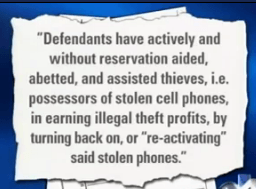 A TV news crew from Salt Lake City that sent undercover reporters into an AT&T store, successfully reactivating a smartphone reported lost or stolen, returned Tuesday with cameras running looking for answers.
A TV news crew from Salt Lake City that sent undercover reporters into an AT&T store, successfully reactivating a smartphone reported lost or stolen, returned Tuesday with cameras running looking for answers.
KTVX News found AT&T stores maintain activation policies that are exceptionally friendly to smartphone thieves, who can reactivate lost or stolen phones with no questions asked.
Stop the Cap! shared video from the station earlier this week showing AT&T employees making life difficult for victims of cell phone theft, but enthusiastically willing to collect money from new customers who received or purchased the stolen property.
A California class action lawsuit has been filed against AT&T over how it handles stolen cell phones.
According to the suit AT&T is, “forcing legitimate customers…to buy new cell phones, and buy new cell phone plans, while the criminals who stole the phone are able to simply walk into AT&T store and re-activate the devices using different, cheap, readily available SIM cards.”
KTVX originally sought to check whether AT&T had the same thief-friendly policies in place in Utah. It turned out the answer was yes — AT&T will turn back on any phone as long as you “put money on it.”

Text from a California class action lawsuit against AT&T
“All you would have to do is pay for the plan,” said an unnamed AT&T store employee. “We’ll set up your account with your ID, and then put the new SIM card in there and put money on it.”
A day after the undercover operation, the TV station confronted the manager at the AT&T store just outside Valley Fair Mall, in West Valley City. He refused to answer questions.
“You can’t tell us anything about whether you know employees are doing that here?” asked reporter Brian Carlson.
“I’m not going to give you any comment on that,” he said.
The store manager referred questions to a regional AT&T representative, but the station could only reach his voicemail.
AT&T’s reactivation policies are not shared by Verizon Wireless, which claims it will not reactivate a phone reported lost or stolen on its network for any reason, except if the request comes from the original phone owner. AT&T’s policies, according to the lawsuit, help fuel cell phone theft by making it easy for thieves to sell stolen equipment to buyers confident they can reactivate and use the equipment immediately after purchase.
AT&T says they’re working on a new plan with the Federal Communications Commission and other cell phone providers to create a centralized database of stolen phones that would keep them from being activated by any wireless carrier. That plan could be in place by the end of this year.
[flv width=”360″ height=”290″]http://www.phillipdampier.com/video/KTVX Salt Lake City ABC 4 confronts ATT store 5-1-12.mp4[/flv]
ABC4 reporters return, with cameras running, to the same AT&T store that a day earlier helpfully reactivated a phone that could have been lost or stolen, no questions asked. (2 minutes)
 The Federal Communications Commission today welcomed two new commissioners to the five-member panel that oversees telecommunications in the United States.
The Federal Communications Commission today welcomed two new commissioners to the five-member panel that oversees telecommunications in the United States.

 Subscribe
Subscribe








